Household Fats, Oil and Grease

For more information
Call 905-546-2489 or
Email [email protected]
After a meal, it can be tempting to rinse anything left over on your plates, pots or pans down the kitchen sink. But when the wrong things go down the drain, such as fats, oils and grease, it contributes to the creation and growth of pipe-blocking masses called fatbergs, that lead to big problems in your home and around the community. Even though your kitchen's leftover fats, oils and grease may be liquid now, they harden when they cool in your pipes and sewers. If you cool, wipe and toss these items in the green bin and never down the drain, you can help to prevent backed up pipes, flooded basements, sewer overflows and damaged sewage pumps.
Hamilton residents play an important role in preventing fatbergs from going down the drain and entering their home and City pipes.
The City has launched the Beware the Berg campaign to help educate residents of:
- The impacts caused by rinsing all types of fats, oils, grease and food scraps down the sink
- The benefits of correct disposal
- De-bunked myths commonly associated with fats, oils and grease
There are many myths and misconceptions associated with fats, oils and grease. Learn why it's important to cool, wipe and toss this waste into the green bin instead of rinsing it down your sink.
- Myth #1: Fats, oils and grease are pretty much liquid. If I rinse them down the sink, they will stay liquid in my pipes and the wastewater system.
Reality: Your fats, oils and grease may be liquid now, but that doesn't mean they will stay liquid later. When rinsed down the drain, they eventually cool, harden and clog. This is exactly what happens with bacon grease. If you leave it in the pan for a while, it hardens and solidifies. The same thing will happen in your pipes. - Myth #2: Running hot water to rinse fats, oils and grease will break it up in my pipes.
Reality: Water and oil do not mix together. Running hot water to rinse fats, oils and grease does not stop them from hardening and congealing in your pipes. Once the water stops moving and the grease hits the cold underground pipes, the fats, oils and grease harden and build up. - Myth #3: My kitchen sink is draining slowly, but that's OK. It still drains eventually, so I don't mind waiting longer for the water to go down.
Reality: If your sink is draining slowly, you already have a clogging problem. Don't wait to fix it, as it can grow to cause damage to your pipes and even cause flooding in your basement. - Myth #4: If I break up my leftovers with a garburator in my sink, the waste will make it through my pipes.
Reality: A garburator does not break up fats, oils and grease before they enter your plumbing system and harden. You should also avoid using garburators to break up food scraps, as even the smallest amounts can stick together and build up in your pipes. - Myth #5: Storing large amounts of oils and grease will cause a smell in my home.
Reality: Empty your kitchen mini bin into your outdoor green cart regularly. You can reduce any lingering smells by freezing it. On waste pick-up day, empty your hardened/frozen grease into the green bin. You can always take large amounts (up to 40 L) to one of our Community Recycling Centres.
Financial benefits to cool, wipe and toss
It costs more to rinse fats, oils and grease down the drain than it does to cool, wipe and toss it into the green bin. These potential costs include:
- Home plumbing repairs to pipe blockages
- Repeated use of drain cleansing chemicals
- Basement flooding repairs
- Structural damage repairs
Environmental benefits to cool, wipe and toss
Correctly disposing fats, oils and grease helps sustain the natural environment in and around Hamilton. Sewage overflows caused by fatbergs can damage local ecosystems and wildlife, lead to floating debris in harbours and bodies of water, and threaten water-based species.
When you bring your liquid oils and grease to a Community Recycling Centre, your waste is recycled and transformed into biodiesel and fertilizer through biogas energy. This fertilizer is then sent to farms all over Ontario to help crops grow. Biodiesel reduces greenhouse gases and emissions, while providing renewable energy at the same time.
See what happens to the fats, oils and grease you toss in the green bin, as they are processed through the City's central composting facility!
Social benefits to cool, wipe and toss
When you cool, wipe and toss fats, oils and grease into the green bin, you are helping to maintain a damage and blockage-free home. Children and youth can also learn the many benefits of correct disposal while learning about food safety in the kitchen, and take those lessons with them as they grow older.
Correct habits also lead to a sense of pride, safety and ownership of your home and community.
Health benefits to cool, wipe and toss
By correctly disposing fats, oils and grease, you are helping prevent raw sewage overflows that are caused by fatberg blockages. These overflows can be hazardous to human and wildlife health since they can bring exposure to viruses and bacteria.
Contaminated bodies of water can lead to contaminated fish, shellfish and water supplies, and pose dangers to swimming.
Cool, Wipe and Toss!
Learn why it's important to always cool, wipe and toss your fats, oils and grease into the green bin alongside Kris P. Bacon, Slick and Stella Sauce.
Beware the Berg!
In #BewareTheBerg Episode 2, our kitchen crew learns all about Fatbergs and how to prevent them from appearing in your home.
A great flood?
It's off to dreamland in #BewareTheBerg Episode 3… Find out what's causing a fright and cool, wipe, toss alongside our cast of kitchen characters!
Instead of rinsing your food scraps or hot cooking grease down the kitchen drain, you should always cool, wipe and toss these materials into your green bin. That's three easy steps!
1. Wait for any hot cooking fats and grease to cool down.
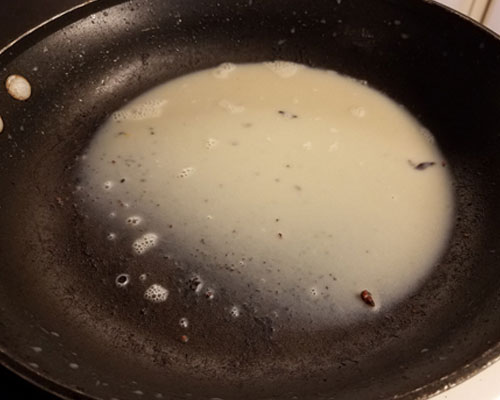
2. Wipe plates, pots and pans to capture all fats, oils, grease and food scraps.
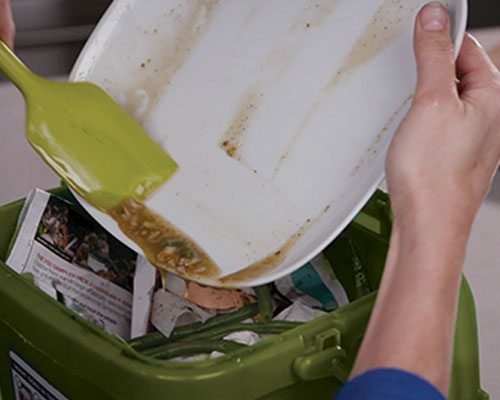
3. Toss this waste into your green bin.
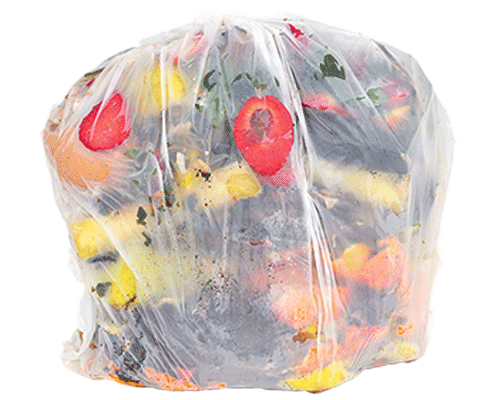
These steps are important because they effectively capture your fats, oils, grease and food scraps in a responsible way that doesn’t damage your home's pipes or cause blockages. If you don't have a green bin, you can cool, wipe and toss food waste into the garbage. Find out how to get a green bin for your home.
Small amounts of liquid oils and grease that will not harden at room temperature (less than 500 mL) should be poured over top of food scraps in the green bin.
Large amounts of liquid oils and grease that will not harden at room temperature (500 mL to 40 L) should be poured into a sealed container and stored in a cool place until full. Once full, bring your container to one of our Community Recycling Centres. You can drop off a maximum of 40 L of liquid oil and grease per visit.
Fatbergs (or 'bergs') are large masses of solid waste that can form in your home and in City wastewater pipes. They are made of congealed fats, oils and grease that have been improperly disposed of down the drain and have cooled and hardened in the wastewater system. To make matters worse, when fats, oils and grease combine with unflushable waste that has been improperly flushed, the fatberg grows into a giant mass.
Fatbergs stick to the interior siding of pipes and slowly grow as more waste sticks and hardens to the fatberg, and if left undetected, a fatberg can completely block wastewater flow, cause sewer backups into your home and lead to expensive repairs.
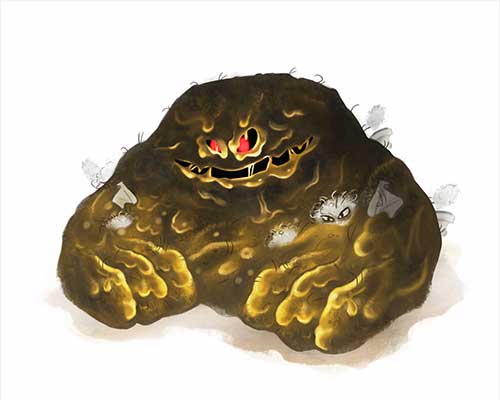
Clogged pipes
Clogged pipes can cause:
-
Raw sewage back-ups into your home and the homes of your neighbours
-
Raw sewage overflows into neighbourhood yards, parks and streets
-
Potential contact with disease-causing bacteria
-
Potential messy and expensive basement clean-ups and/or sewer line cleanup, as it may not be covered by your homeowner’s insurance policy
-
Increased operational and maintenance costs for the City, which causes higher sewer and water rates for residents
Fats, oils and grease are often byproducts of cooking. Common examples include:
- Animal fats left over from cooking meats (i.e. bacon grease, pan drippings, etc.)
- Butter and margarine
- Cooking grease and oils (i.e. lard, olive oil, coconut oil, etc.)
- Condiments, dressings and marinades
- Deep frying oils
- Gravies
- Sandwich spreads
- Soups, stews and sauces
- Yogurt
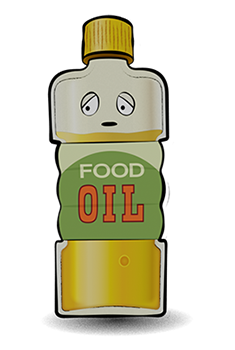
All food scraps, greasy napkins and other soiled paper products should also be tossed into the green bin.
Here are some tips to avoid blockages in your pipes due to fats, oil and grease:
- Commercial additives such as detergents may not dissolve grease. The grease may pass through the sewer pipe from your home and harden in the main sewer line of your street and build up over time causing a blockage and potentially a back-up into your home.
- Before washing your dishes, scrape grease, fat and cooking oil into your green bin. Soak up excess liquid grease with paper towels and place them in your green bin as well.
- Use a sink basket or strainer to help prevent food residues from going down the drain.
- We do not recommend garburators, as they do not stop grease from going down the drain and shredded food waste can create blockages in your sewer.
- Take residential waste fats to one of the City’s Community Recycling Centres. You can drop off 40L of waste fats per visit for free.
